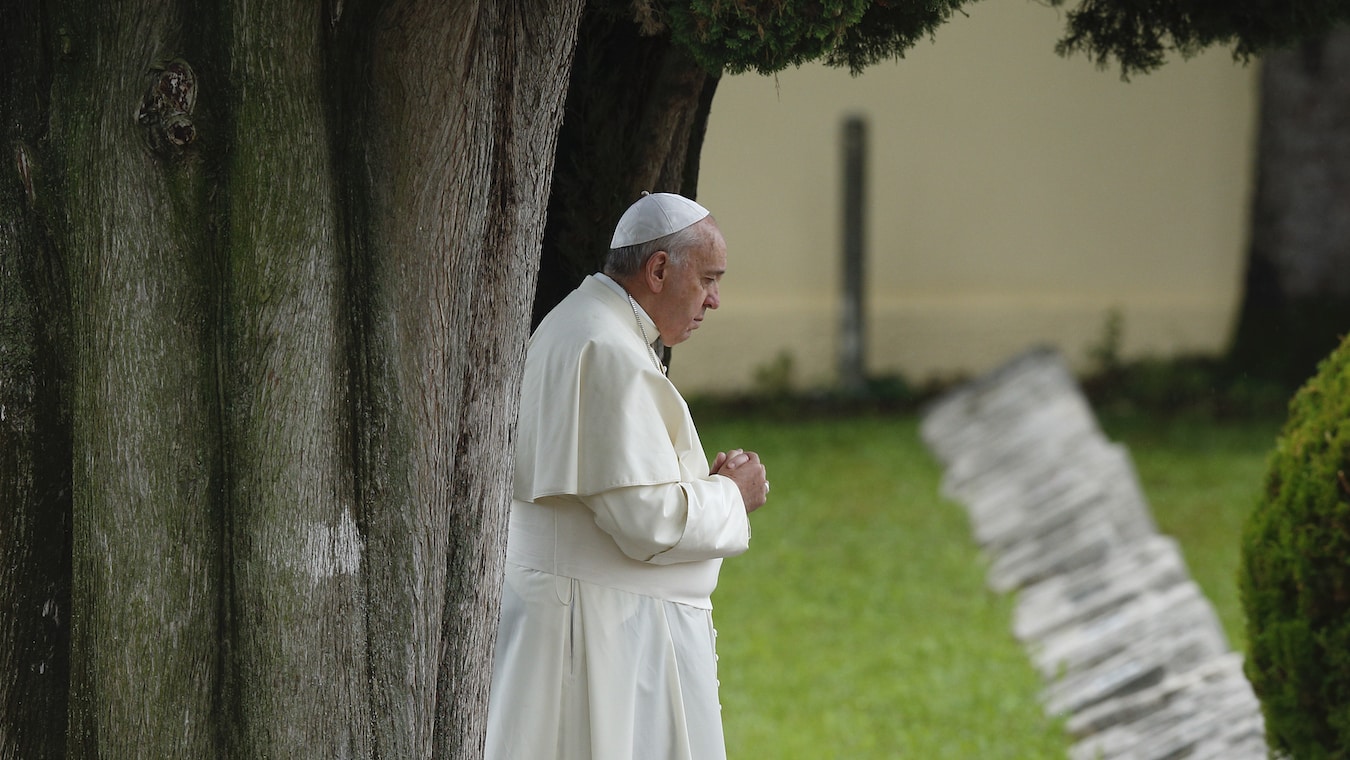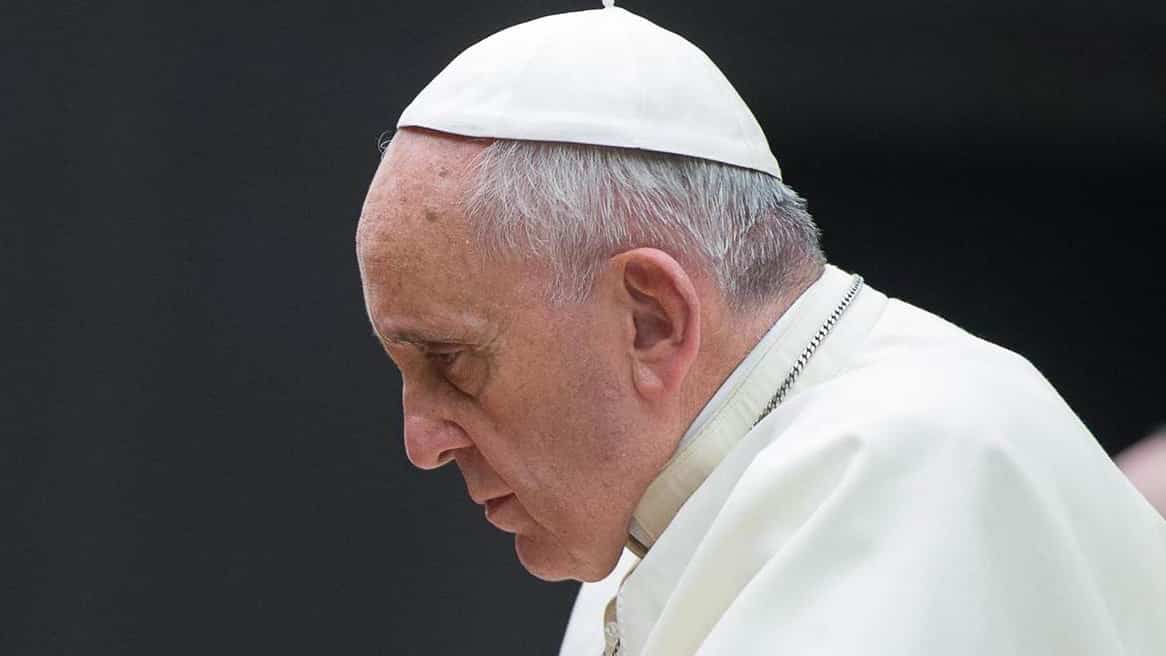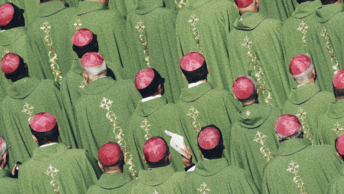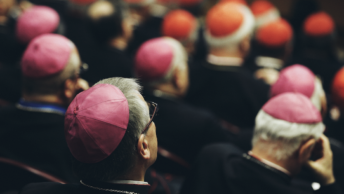I have written before concerning Pope Francis’ contempt for conservative Catholics. One such example of that contempt was his statement that “in the United States . . . there is a very strong reactionary attitude. It is organized and shapes the way people belong, even emotionally. I would like to remind those people that being backward-looking is useless and we need to understand that there is an appropriate evolution in the understanding of matters of faith and morals . . . Doctrine also progresses, expands and consolidates with time and becomes firmer, but is always progressing.”
Let’s pause for a moment and note the profound irony of that statement. Here is the leader of the institution that has been more backward-looking than any other for two thousand years, proclaiming that looking back is useless. And as if that were not strange enough, he is ridiculing lay people, nuns and priests, bishops, cardinals, and popes alike for believing what they were commanded to believe under pain of sin. (If we listen closely, we can hear countless legions of faithful believers spinning in their graves.)
Francis’ terms “reactionary” and “backward-looking” clearly refer to conservatives, which suggests he is a “progressive” with a pronounced tilt to the left. Two recent “defrockings,” one of a conservative priest, the other of a conservative bishop, support that suggestion.
In 2022, Francis defrocked Father Frank Pavone, America’s leading Catholic pro-life advocate. Then, after doing that, he appointed a pro-abortion economist to the Vatican’s Pontifical Academy for Life. This combination of events implies that the Pope has reservations about the Church’s long-standing pro-life teaching. (Evidently that is his idea of looking forward.)
Frank Pavone had this reaction to his dismissal: “They [the hierarchy] don’t like the fact that people are supporting Priests for Life . . . [because the hierarchy] see us saying the things and doing the work that they wish their own priests and their own bishops were doing. . . This is getting some of [the hierarchy] downright angry because they don’t control our board. They don’t control our finances. They don’t control the influence of our message.”
A year after the Pavone firing (in 2023), Francis removed Texas Bishop Joseph Strickland from his pastoral role, reportedly because of his numerous criticisms of Francis’ liberal reforms in the Catholic Church, particularly those involving abortion, transgenderism, and same-sex marriage.
Strickland has also said “I reject [Pope Francis’] program of undermining the Deposit of Faith.” (Keep in mind that Strickland was not just another bishop. He earned a Licentiate of Canon Law degree from Catholic University of America and in 1994 was named a “prelate of honor” by Saint Pope John Paul II.)
Strickland’s response to his dismissal was, “The only answer I have to that is because forces in the Church right now don’t want the truth of the Gospel,” adding that “They want it changed. They want it ignored.” And in an interview with Newsmax, he offered this advice to Catholics—”Say no to the toxic nightmare of the Synod . . . [that wants to] reshape the truth of religion. Truth doesn’t change, no matter how much we want it to.” He went on to explain that he is “worried about the denial of truth in the Church, . . . [but believes] revival of faith will come from the laity.”
Many in and outside the Catholic Church are asking whether Pavone and Strickland are renegades who deserved the treatment they received, or heroes upholding the Catholic faith while those pledged to uphold it are undermining it. Most Catholics no doubt lean toward the first answer, because the Pope sits in the legendary Chair of St. Peter. But it is worth remembering that not every pope has honored that office. In fact, more than a few have sullied it.
I submit that the main reason Bishop Strickland and other conservative Catholics are criticizing Pope Francis and other “progressives” is neither animosity, nor ignorance of Catholic teaching, nor a spirit of rebelliousness. It is Francis’ failure to meet his fundamental obligation to explain why long-standing Catholic teachings need to be changed at all, let alone radically. Has archeology uncovered a new gospel that invalidates a traditional Catholic teaching? If so, what does that new gospel say and why is the change in teaching required? Has a scientific development disproved traditional teaching’s merit? If so, what was that scientific development and exactly how does it affect the teaching?
Everyone who expresses a viewpoint to others has the obligation of explaining what makes it worthy of acceptance. That is not only a courtesy to those spoken to. It is also a demand of logic that has been honored by responsible communicators since the dawn of humanity. No one is exempt from it no matter what level of anointing he has reached, or how brilliant he (or she) feels when looking in the mirror. (Consider the doctrine of Infallibility a special case if you will, but the messages of Pope Francis discussed here do not meet the required standard for that doctrine to apply.)
Even many who strongly support Pope Francis will admit that explaining the rationale for his views is not one of his strengths. Where his 20th century predecessors acknowledged the complexity of moral and theological issues and dealt carefully with conflicting viewpoints and respectfully with those who held them, Francis has a tendency to toss out his ideas without clarifying let alone developing them. That tendency is not only un-papal but un-scholarly and at times downright careless.
Francis’ statements on abortion, transgenderism, same-sex marriage, and even climate change are examples of such carelessness. Indeed, they give the impression of “rushing in where angels fear to tread.” The fact that those statements seem inconsistent with traditional Catholic teaching, and he gives no outward sign of concern over that inconsistency, explains why Pavone, Strickland, and millions of other conservative Catholics who revere that teaching wonder where Francis is leading the Church.
But I believe there is another, equally troubling reason for conservative Catholics’ concern about the Pope’s fidelity to the Faith. The positions he takes, indeed preaches, on issues like those mentioned in the previous paragraph are almost exactly like those expressed by “woke” progressives and parroted by the mainstream media. So stark is the similarity that older Catholics who grew up with great respect for the Pope and believed that he spoke for the Holy Spirit cannot help but wonder, “Can these messages that are more often than not directly opposed to Catholic teaching possibly come from the Holy Spirit?” If they do, that would mean the Holy Spirit is contradicting what He communicated through the centuries to other Popes and inspired the Magisterium to include in the Catechism that conveyed the faith to billions of people. To put it more bluntly, the clear implication would be that God cannot make up his mind. To entertain such a thought is, of course, to deny God’s nature, in particular his omniscience, and this is blasphemous.
Father Pavone and Bishop Strickland believe that a number of Pope Francis’ teachings are in opposition to the Catholic faith. That is a serious claim that needs to be carefully examined. Francis’ response, defrocking his critics, does not solve the problem. It only intensifies the suspicion that he has something to hide. The correct approach is for him and the rest of the hierarchy to encourage more open, honest discussion in the Church, and not only among themselves, but also among priests, nuns, and the laity, particularly those with expertise in ethics and theology. Most important, that discussion must not be fashioned to demonize and sideline conservatives. That strategy is no more appropriate or helpful than was the reverse—demonizing liberals—which was the typical pattern in previous centuries.
I began this essay by noting the irony of Pope Francis, the leader of a Church that has traditionally considered looking backward a virtue, is now calling looking backward “useless.” Let me close with a similar irony. In his homily of October 1, 2019, Pope Francis said “God has entrusted us with . . . many gifts . . . These gifts, these talents, are not something to be stored in a safe; they are a true vocation: the Lord calls us to make our talents bear fruit, with boldness and creativity. God will ask us if we stepped forward and took risks, even losing face.” Now, just a few years later, he has punished a priest and a prelate for following his wise advice by using their God-given talents of discernment, stepping forward, taking risks, and losing much more than “face.” To call such a contradiction baffling would be an understatement.
Copyright © 2023 by Vincent Ryan Ruggiero. All rights reserved.








